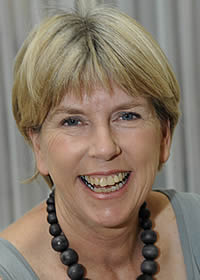Speaking with difficulty
More than one in five boys and one in seven girls have difficulty in learning to talk, according to research released last week by Jean Gross, England’s “Communications Champion”.
These are alarming figures, and the story was a big hit, appearing in The Daily Telegraph, The Times, The BBC, The Guardian, The Independent, The Daily Mail, Metro, the Mirror and The Observer. Ms Gross, an educational psychologist appointed to the post in October last year, elaborated on the findings in an interview in yesterday’s Sunday Times by suggesting that the influence of TV may be a contributory factor.
Many households have TV on all the time, she said, and there is evidence that in such situations “the amount adults talk to young children falls away to almost nothing.” Yet toddlers learn by hearing words and practising them, often in a rhythm with one familiar adult.
The research results were published to coincide with Ms Gross taking up the job of championing better provision of services for children with language difficulties. Her post was established in response to a report published last year by a committee chaired by John Bercow MP, who by a nice coincidence has since become the Speaker of the House of Commons. No jokes about this, though: Mr Bercow is the father of an affected child and has become something of an expert on the subject.

How the Daily Telegraph reported the story
Ms Gross is funded jointly by the Department of Health and the Department for Children, Schools and Families, but neither department’s website appears to provides any further detail of where these alarming figures originated. Media reports, however, say that their source was a poll of just over 1,000 parents by YouGov between December 15 and 18.
No disrespect to YouGov, but is this really the way to discover the dimensions of a serious problem? There have been a number of academic studies, both in the UK and abroad, of the incidence of language difficulties, all of which set the proportion of affected children lower than YouGov does.
John Bercow’s own report, for example, says that about 7 per cent of five year-olds entering school have significant difficulties with speech and/or language. The Royal College of Speech and Language Therapy, in a report on commissioning and planning services for affected children, quotes a range of figures between 3.8 and 12.6 per cent from different sources and for different age groups.
A research report from the universities of London and Warwick, carried out for the Department of Education and Skills (now the DCSF) and published in 2007, estimates the prevalence rate at 7 per cent. The highest figure comes from a study of children referred to speech and language therapy services by Middlesborough Primary Care Trust. This study, published in 2004, estimated that 14.6 per cent of British children might have speech and language difficulties if Middlesborough is representative of the UK as a whole – a total of 85,000 to 90,000 cases per year, more than twice John Bercow’s estimate of nearly 40,000.
What does this tell us? That the incidence of these problems, depending upon which source you favour, lies between 5 and 15 per cent, with most estimates in the region of 5 to 7 per cent. But the YouGov poll that attracted last week’s headlines put the figure at 22 per cent for boys and 13 per cent for girls.
Ms Gross (pictured, below) may be right to suggest that too much TV is stunting language development in toddlers, but that’s her personal opinion, in no way supported by the YouGov evidence. Nor can the results be held to justify media claims that a generation is growing up inarticulate.

In The Sunday Times, she said that evidence for this was anecdotal, but that head teachers were reporting more children coming into their nursery classes unable to string a sentence together. I’ve heard the same anecdotes myself, from teachers with long experience whose judgement I trust. But I’d prefer some harder data.
She’s also critical (in today’s Telegraph, Sun and Daily Mail) of texting, saying it circumscribes children’s vocabulary. She’s planning to enlist Stephen Fry, if he’s got any spare time from Twittering, to support a campaign to reverse this. If he succeeds, at least Britain’s teenagers will be capable of messages 140 characters long.
Ms Gross deserves every support in helping to shape better services for the language-challenged. I suspect the YouGov poll was a bit of a gimmick to get her task off to a lively start. But by asking parents, who are naturally anxious if they think their children are late to start speaking, I suspect it overestimated the scale of the problem. Does this matter? Not if you don’t care about policy being based on sound evidence.



